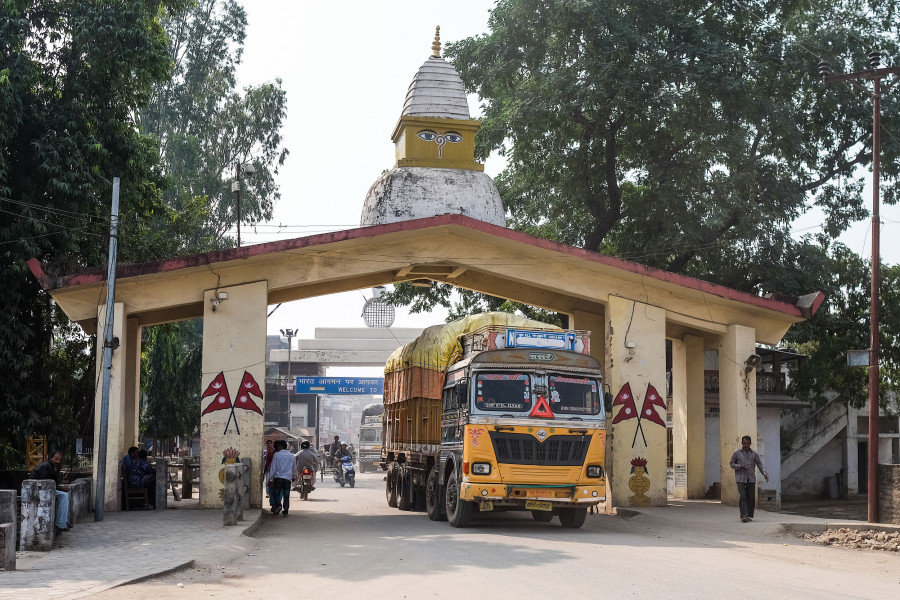Money
Federal government faces a revenue deficit of Rs 90 billion in the first half
Government officials blame a drop in imports and sluggish economic activities for the fall in revenue collection.
Prithvi Man Shrestha
The income deficit reached around Rs90 billion as of mid-January, according to the Department of Customs and Inland Revenue Department. Most of the shortfall has been attributed to a decline in revenue growth at the customs offices.
According to the Customs Department, it received only Rs180 billion against the target of Rs244 billion, resulting in a deficit of Rs64 billion. Revenue collection by revenue offices also witnessed a deficit of Rs26.31 billion compared to the target.
According to the Inland Revenue Department, it had aimed to collect Rs230.97 billion in the first half of the current fiscal, but received just Rs204.66 billion.
Government officials said they failed to meet the target which is ambitious compared to past revenue collection trends. They maintained that the collection was still good compared to past growth trends.
“Revenue collection from the customs offices was affected severely due to a fall in imports of key revenue generating items such as vehicles, fuel, gold and iron and steel and machinery, among others,” said Sishir Ghimire, information officer at the Department of Customs.
As of the first five months of the current fiscal, imports of petroleum products decreased by 13.5 percent, steel and iron imports decreased by 25.3 percent, machinery by 2.6 percent, transport vehicles and their parts by 6.3 percent and gold by 60.4 percent, according to the Trade and Export Promotion Centre, a trade promotion body under the Ministry of Industry, Commerce and Supply.
The government has discouraged imports of products like vehicles with the central bank issuing a directive to banks and financial institutions to increase the down payment on auto loans to at least 50 percent.
Officials and experts admit that sluggish economic activities also contributed to a decline in revenue collection. “At the moment, neither has the government been able to spend the capital budget nor is the private sector investing as expected,” said former finance secretary Shanta Raj Subedi.
As of January 18, capital expenditure stood at just 14.62 percent, according to the Financial Comptroller General Office. Investment by the private sector also remained sluggish.
As per the Monetary Policy 2019-20, the central bank aims to increase credit to the private sector from banks and financial institutions by 21 percent on average in this fiscal.
But as of the first five months of the current fiscal, lending had grown by just 6.2 percent. During the same period in the previous fiscal year, lending to the private sector had increased by 10.2 percent.
The private sector makes most of its investments by borrowing from banks and financial institutions. The private sector blamed the investment climate which they claim to be deteriorating due to the government’s efforts to control it instead of helping it.
Bankers pointed to the introduction of a system under which banks have to provide loans based on the borrower's balance sheet submitted to the tax authority as another reason for the drop in investments.
Businessmen are being accused of creating two balance sheets—one to submit to the tax office to pay less tax and another to banks to receive bigger loans.
Subedi said that the decreased growth in the import of construction materials and machinery showed that economic activities were slowing down in the country. “Sluggish economic activities within the country is one of the reasons why internal revenue collection also failed to meet the target,” he said.
According to Subedi, the tax authority’s failure to enforce tax laws stringently, particularly in the case of tax dues, also contributed to the revenue deficit.
The Inland Revenue Department is responsible for collecting internal revenue. As of the first half of the current fiscal year, it had failed to meet the target in all revenue headings.
Income tax, VAT and excise duty are the three major revenue sources, and the department missed the target in all three, according to the statistics from the Revenue Department.
Income tax collection stood at just 91.16 percent of the targeted amount. The government had aimed to collect Rs108.11 billion as of mid-January, but collection stood at just Rs98.56 billion.
The Revenue Department had expected to bridge the revenue gap after receiving the first instalment of corporate income tax by the first half of the current fiscal year.
Enterprises are required to pay 40 percent of the projected income tax by the second quarter of the fiscal year, 30 percent in the third quarter and the remaining 30 percent by the end of the fiscal year.
Even after receiving payment of tax dues amounting to Rs4.5 billion from Ncell, the Revenue Department was short of the collection target. It also failed to meet the collection targets for VAT, excise duty, house rent tax and tax on interest income, among others.
Bol Raj Acharya, director at the Revenue Department, said that the revenue target for his office was 41 percent of the collection in the last fiscal year, which is ambitious considering the average revenue growth of just over 20 percent in the last several years.
“As of the first half of the current fiscal year, revenue growth was 25 percent against the collection during the same period in the last fiscal year, which should be considered modest,” he said.




 9.7°C Kathmandu
9.7°C Kathmandu















